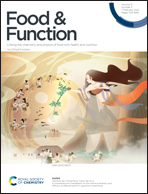Food-derived cyanidin-3-O-glucoside reverses microplastic toxicity via promoting discharge and modulating the gut microbiota in mice†
Abstract
Microplastics (MPs) ingested and accumulated by organisms would ultimately pose a threat to humans via the food chain. A balanced gut microbiota contributes to many health benefits, which is readily influenced by environmental chemicals such as MPs. Cyanidin-3-O-glucoside (C3G), a bioactive compound of the anthocyanin family, possesses a variety of functional effects including anti-oxidant and anti-inflammatory, as well as gut microbiota modulation. C3G has been demonstrated to prevent polystyrene (PS) induced toxicities in Caco-2 cells and Caenorhabditis elegans (C. elegans) via activating autophagy and promoting discharge. In the present study, we aimed to explore the alleviation effect of C3G on PS induced toxicities in C57BL/6 mice. Our results showed that the supplementation of C3G effectively reduced the tissue accumulation and promoted the fecal PS discharge, leading to alleviation of the PS-caused oxidative stress and inflammatory response. Meanwhile, C3G modulated PS-associated gut microbiome perturbations and regulated functional bacteria in inflammation such as Desulfovibrio, Helicobacter, Oscillospiraceae and Lachnoclostridium. Also, C3G administration initiated alterations in functional pathways in response to xenobiotic PS, and reduced bacterial functional genes related to inflammation and human diseases. These findings may offer evidence for the protective role of C3G in the intervention of PS-induced toxicity and gut dysbiosis.



 Please wait while we load your content...
Please wait while we load your content...